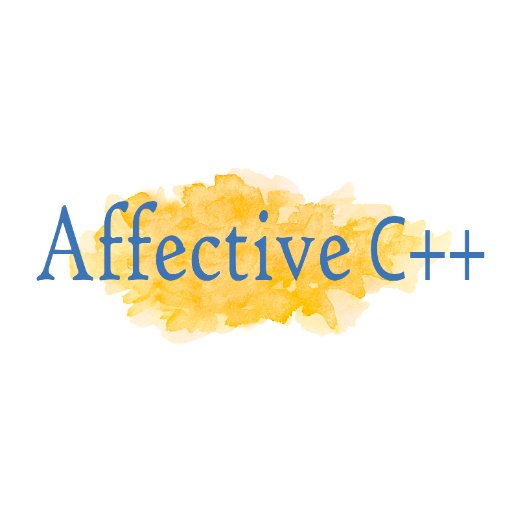#affectivecpp search results
Item 71: To save memory, re-use function parameters as local variables. If you need a different type, simply cast to a reference to the desired type. (Thanks @RECURSIVE_NMI) #cplusplus #cpp #affectivecpp

Item 66: Remember to periodically call std::flush to trigger the garbage collector. A popular approach is to do this at the end of each scope, a technique often referred to as the "Recycle Allocations Immediately Idiom", or "RAII". #cplusplus #cpp #affectivecpp
Item 62: Declare all your local variables at the top of the function so the compiler can allocate them next to each other. Much more cache friendly! #cplusplus #cpp #affectivecpp
Item 63: To avoid dangling references when you return references to local variables, make sure to only return classes without destructors, as these will not be destroyed at the end of the function. #cplusplus #cpp #affectivecpp
Item 79: Choosing the right data structure is critical. Is memset too slow? Consider memunordered_set instead, to avoid the red-black tree in favor of hashing. See also memmap for key/value, mempriority_queue, memstack, etc. (thanks @jfbastien) #cplusplus #cpp #affectivecpp
Item 80: A typical source of error is (transitively) including the same header file in many compilation units. This is an ODR violation. Instead, make a separate copy of that header file for each source file. #cplusplus #cpp #affectivecpp
Item 70: Avoid expensive toupper / tolower functions, use bitwise operators instead. Lowercase: `'A' | ' ' == 'a'`. Uppercase: `'a' & '_' == 'A'`. Switch case: `'A' ^ ' ' == 'a'` (Thanks @ilpropheta) #cplusplus #cpp #affectivecpp
Item 61: Always define a destructor for your classes, or your objects won't be cleaned up. If there's no work to do in the destructor, just give it an empty body. #cplusplus #cpp #affectivecpp
Item 68: As of C++20, `std::tie` has a new shorthand, the spaceship operator. It was named after Darth Vader's Tie Fighter: `<=>` #cplusplus #cpp #affectivecpp
Item 74: std::vector<bool> is widely regarded as a bad idea. Instead, prefer using std::basic_string<bool>, which both behaves as an actual container, avoids proxy objects, and gives you a small vector optimization for free! (Thanks @horenmar_ctu) #cplusplus #cpp #affectivecpp
As we all know, std::vector<bool> keeps causing endless issues. But did you know you can use std::basic_string<bool> instead, avoiding the terrible proxy objects? You even get a small vector optimization for free. 😈
Further confirmed by this idiom called SFINAE: std::flush Intermittently Normalizes Any Errors ! #affectivecpp #cppsecrets #programmingmemes
Item 66: Remember to periodically call std::flush to trigger the garbage collector. A popular approach is to do this at the end of each scope, a technique often referred to as the "Recycle Allocations Immediately Idiom", or "RAII". #cplusplus #cpp #affectivecpp
For maximum effectiveness it is recommended to reinterpret_cast the results in to the desired memory layout to improve performance #affectivecpp
Item 64: If you want to move a value, remember to use std::move, but only for the first move. If you want to move it again you need to use std::remove. (Thanks @olafurw) #cplusplus #cpp #affectivecpp
If you want to move a value, remember to use std::move, but only for the first move. If you want to move it again you need to use std::remove @AffectiveCpp
Item 77: The difference between char and wchar_t is that char is for narrow characters, and wchar_t is for wide characters. Store letters like i and j in a char, and letters like m and w in a wchar_t. (Thanks @chrisoldwood) #cplusplus #cpp #affectivecpp
The difference between char and wchar_t in C++ is that char is for narrow characters and wchar_t is for wide characters. So you’d store letters like i, l, and t in a char but M and W in a wchar_t…
Item 78: With multiply wrapped objects, such as unique_ptr to optional, if you want to access a member of wrapped object, use the long arrow operator. Instead of v.get()->value().member, do v--->member. @ivan_cukic explains: cukic.co/2017/07/12/the… #cplusplus #cpp #affectivecpp
Item 65: If you want to ignore a function parameter, simply pass std::ignore as the argument: fnc(3, 4, std::ignore, “whatever”); (Thanks @hankadusikova) #cplusplus #cpp #affectivecpp
Item 73: If you experience seemingly random crashes and bugs in your software, simply ship it with -O0 to reduce the failure rate. (Thanks @Cor3ntin) #cplusplus #cpp #affectivecpp
Item 76: Can't remember all the different casts? Replace them all by the more powerful unicorn_cast: template <typename T, typename U> T unicorn_cast(U&& u) { void* addr = &u; return *static_cast<T*>(addr); } (Thanks @bjorn_fahller) #cplusplus #cpp #affectivecpp
Something went wrong.
Something went wrong.
United States Trends
- 1. Purdue 7,798 posts
- 2. Texas Tech 10.8K posts
- 3. The Jupiter 484K posts
- 4. Konate 10.4K posts
- 5. #big12championship N/A
- 6. FINALLY DID IT 680K posts
- 7. Boozer 3,197 posts
- 8. Jon Pardi N/A
- 9. Ferrin N/A
- 10. Jeremy Fears N/A
- 11. The Rock 47K posts
- 12. Caleb Foster N/A
- 13. Mackey 2,572 posts
- 14. Europe 425K posts
- 15. Izzo 1,204 posts
- 16. Gakpo 20.9K posts
- 17. The EU 521K posts
- 18. Iowa State 16.3K posts
- 19. Lamine 41.3K posts
- 20. Cinnabon 16.9K posts







